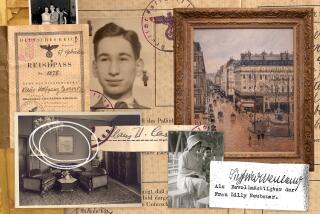Gallery Disputed by Art Expert : Forgery probe: Appraiser says Upstairs Gallery distorted his findings. But two other experts agree with the Beverly Hills shop.
- Share via
Three weeks after a Beverly Hills art gallery claimed that experts had “authenticated” more than 1,500 lithographs seized from its store by art forgery investigators, one of those experts has accused the gallery of distorting his findings in an attempt to make people believe that the works were originals.
Bernard Ewell, a Colorado-based appraiser who is one of the nation’s leading experts on works by Salvador Dali, examined 1,478 Dali prints seized from the Upstairs Gallery. He concluded that they were “legitimate and authentic reproductions and copies of Dali images”--meaning that they were authorized and signed by the artist but that Dali did not create them.
But in a press statement issued last month, the gallery said only that experts found the limited-edition works “legitimate and authentic.”
Ewell says the gallery misrepresented him and misled the public.
But the gallery’s lawyer says Ewell is splitting hairs and said authorized reproductions, by today’s art standards, can justly be called authentic. The two other experts who worked on the case agreed.
“The issue here was, ‘Are they fakes?’ ” lawyer Timothy Applegate said. “In our release we responded to that. The key thing is that we just did not go into greater detail.”
The Dali images were among 1,648 prints confiscated in a widely publicized raid on the Rodeo Drive gallery and its warehouse last year. The raid, in which works credited to Joan Miro and Marc Chagall were also seized, is part of what authorities have termed a wide-ranging investigation into art fraud.
Upstairs Gallery has not been charged with any crime. And although Los Angeles police said Thursday they still believe that Upstairs Gallery sold phony artwork, Detective William Martin, who is handling the investigation, said the probe is now moving away from the Dali prints and toward the Miro and Chagall works.
After the raid, the gallery hired Ewell, along with Miro expert Howard Russeck and Chagall expert Martin Gordon, to examine the prints.
Both Russeck and Gordon said they had no problem with the gallery’s statement. But they noted the definition of original lithographs is in flux because changing technology allows for works to be reproduced with the artist’s authorization, but without his participation.
Such prints are known as “afters” in the art world, and all three experts said it is no crime to sell them, so long as they are not misrepresented at the point of sale. Applegate said the Dali prints in question were never offered for sale; they were seized from the company warehouse.
Although experts say some afters are quite valuable, Ewell said the Dali afters are “virtually worthless” because the market has been flooded with so many phonies.
“Auction houses will not take them on consignment,” he said. “Private art dealers will not touch them. It is my experience that they are not saleable.”
More to Read
The biggest entertainment stories
Get our big stories about Hollywood, film, television, music, arts, culture and more right in your inbox as soon as they publish.
You may occasionally receive promotional content from the Los Angeles Times.










